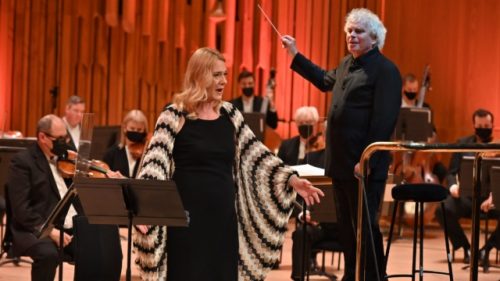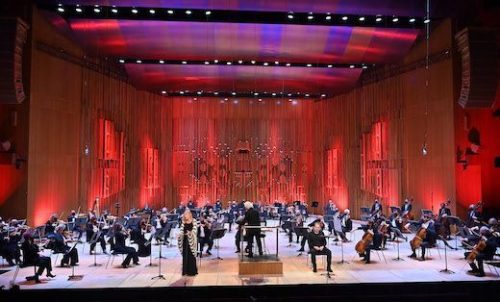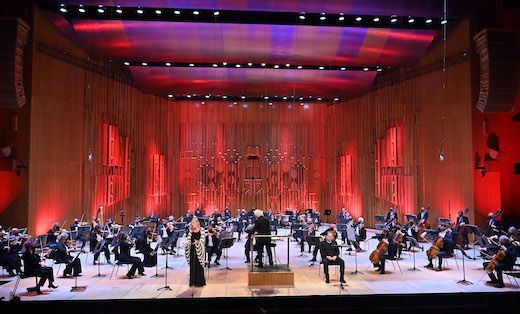 United Kingdom Mahler: Magdalena Kožená (mezzo-soprano), Andrew Staples (tenor), London Symphony Orchestra / Sir Simon Rattle (conductor). Livestreamed (directed by Rhodri Huw) from the Barbican Hall, London, 9.5.2021. (JPr)
United Kingdom Mahler: Magdalena Kožená (mezzo-soprano), Andrew Staples (tenor), London Symphony Orchestra / Sir Simon Rattle (conductor). Livestreamed (directed by Rhodri Huw) from the Barbican Hall, London, 9.5.2021. (JPr)

(c) Barbican/Mark Allan
Mahler – Das Lied von der Erde (arr. Glen Cortese)
Sir Simon Rattle continued his long goodbye as Music Director of London Symphony Orchestra and introduced this Barbican Hall performance: ‘I have to say this is an extremely emotional experience. Two days ago was the first time we had actually been back playing in the Barbican, in our home on this stage, and now although we don’t have a live audience – that comes in a few more days – we have the opportunity to perform Mahler’s Das Lied von der Erde (‘The Song of the Earth’) for you with soloists Magdalena Kožená and Andrew Staples in a version for a slightly smaller orchestra. But it’s been very, very skilfully made so that you actually hear basically what you would normally hear in a normal performance, but of course with [social] distancing we can’t fit all the people on the stage that we could.
But this great masterpiece from the end of Mahler’s life still tells its extraordinary story and it’s almost ironic in a time when there was so much death to know how the planet has healed itself. The piece […] tells not only about the end of things and the optimism of the future which there is to be. And in some ways, it is almost an accident that we play this today but there could not be a more appropriate piece for us all to be coming back to our home.’
With sadly only a few years to live in 1908, Mahler having completed his conducting commitments went to his summer retreat in the southern Tyrolean village of Toblach (now Dobbiaco) where he could start composing again. (When I visited his composing hut there several years ago, I found it in a small children’s zoo and surrounded by its pigs, goats and chickens!) A friend had given Mahler a volume by Hans Bethge entitled Die chinesische Flöte (‘The Chinese Flute’), a volume containing German translations of a collection of some eighty Chinese poems. The poems appealed to Mahler and using seven of them, he turned them into the six songs of Das Lied. It is the sixth song (‘Der Abschied’) that includes two poems and Mahler also made his own important alterations to the text.
I have also written before how Mahler’s choice of key signature is highly significant for each of the songs: A minor – ‘Das Trinklied …’ ; D minor – ‘Der Einsame in Herbst’; B-flat major/G major – ‘Von der Jugend’; G major – ‘Von der Schönheit’; A major/F major – ‘Der Trunkene …’ ; C minor – ‘Der Abschied’. Considering Mahler’s superstition about the finality (fatality?) of ninth symphonies, with one exception (the second song), he avoids the use of D minor which was the key of both Beethoven and Bruckner’s Ninth – and last – Symphonies. (Later of course, Mahler’s own Ninth Symphony would be in D minor.) The second song is about the fear of death and so the choice of key is undoubtedly not a coincidence and the fifth song which is possibly the most despairing of the cycle, ends significantly in F major, the relative major of D minor. The principal key of ‘Der Abschied’ is C minor moving finally to C major, the relative major of the A minor in which the work begins.

Sir Simon Rattle and the LSO performing Das Lied are known quantities and they play as well as expected with virtuosic contributions from Gareth Davies’s flute, Julian Koch’s oboe, Rosie Jenkins’s cor anglais, Chris Richards’s clarinet, Rebecca Gilliver’s cello and guest leader Natalia Lomeiko’s violin; playing – as all their 50-plus colleagues when appropriate – with character and individuality. Throughout there was impeccable balance between orchestra and soloists, and all the vision, intensity and gut-wrenching emotion you would expect for a memorable performance of Das Lied von der Erde which this was.
This Das Lied was notable for the contribution of Magdalena Kožená (aka Lady Rattle) and – across the arc of her three songs – Kožená’s slightly operatic, though unexaggerated, involvement drew the listener in to her rather intimate, definitely emotionally draining, exploration of Mahler’s world-weariness and the eternal. ‘Der Abschied’ (‘The Farewell’) was protracted, intense and achingly sad, with haunting final repetitions of the word ‘ewig’ (‘forever’) that will indeed stay with you for a long while, though not perhaps forever. Not everything was perfect – could it ever be? – ‘Der Einsame im Herbst’ (‘The Lonely One in Autumn’) when Kožená sang of ‘Sun of love’ there could have been more radiance to her otherwise warm mezzo tones. And although we could not have better heard the ‘spirited horses’ with their hooves flying from Rattle and the tempered raucousness of the LSO’s thundering accompaniment; Kožená could only survive the lines ‘Das Ross des einen wiehert fröhlich auf, und scheut und saust dahin’ by resorting to a Brecht-Weill Sprechtstimme. (This passage is notoriously difficult I must admit, and the translation oddly was ‘One of the horses neighs happily, and shies and whizzes there’.)
In comparison, Andrew Staples was more detached from the texts than Kožená and clearly not as ‘involved’ as she was; though as is frequently the case with English tenors his German diction was – to my ears – impeccable. The tenor has a thankless task and I doubt one exists in our current generation who can rise to all the challenges Mahler sets him in Das Lied. Staples obviously has a voice of great musicality, and I wondered whether he has any plans for more significant Wagner roles in the future because at times – although I was not hearing him live – there was a proto-Siegfried sound to the top of his voice when he was pitched against Mahler’s incandescent orchestration at its loudest. Staples’s singing never had the heightened dramatic intensity of some interpreters and his expression was somewhat unvarying especially in the ‘Dunkel ist das Leben, ist der Tod’ (‘Dark is life, is death’) repetitions of his first song. He never convinced me he was ‘drunk’ in ‘Der Trunkene im Frühling’ (‘The Drunkard in Spring’) but there was a refined use of mezza voce for the words ‘Der Vogel singt und lacht!’ (‘The bird sings and laughs’).
Rhodri Huw’s direction drew us into this wonderful performance thanks to lingering close-ups of the singers, conductor and musicians and each song saw the concert platform atmospherically bathed in a different hue varying from the blue of the first song to crimson for ‘Der Abschied’.
Jim Pritchard
This concert was part of Live from the Barbican and the series continues throughout spring/summer. All these Live from the Barbican concerts will be streamed live from the Barbican Hall on a pay-per-view basis, with live audiences in the Hall from 17 May onwards. (For a full list of concerts click here.)
